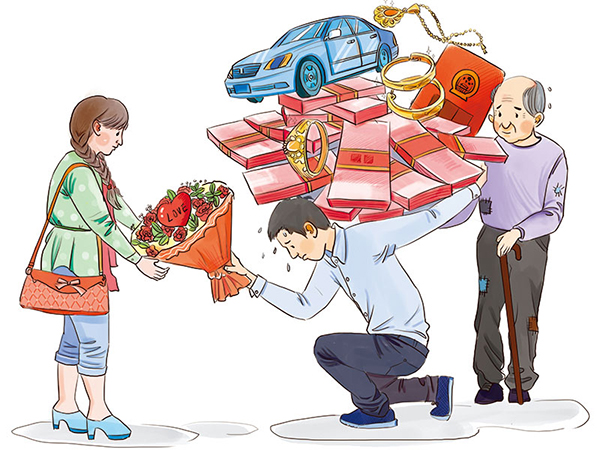Reform of betrothal gift custom proves arduous


The Intermediate People's Court of Datong, Shanxi province, announced its second-instance verdict on Wednesday in a case of suspected rape. The court dismissed the appeal of the man while upholding a lower court verdict giving him a three-year prison term for raping his fiancee shortly after their engagement.
Apart from the case itself, the other focal point is the two families' squabble over betrothal gifts. After giving his fiancee's family 100,000 yuan ($13,697) and some gold jewelry as betrothal gift, the man's family, from a village in Datong, where the local farmers' average per capita income is 16,328 yuan, was required to add the woman's name as joint owner of a house with the man — something the man agreed to in writing but said later that his fiancee had forced him to sign it — and give another 88,000 yuan to the woman's family as the last part of the betrothal gift once his parents had enough money from selling the pigs they raise.
Were it not for the betrothal gifts, the case may not have been so complicated. The court dismissed online claims that the woman's family was using the rape case to extort money. Before the court registered the case, the woman had tried to return the 100,000 yuan and two rings, but the man refused to accept them feeling outraged that he was charged with rape.
Data from a national marriage customs survey show that the average bride price in rural areas reached 128,000 yuan in 2024, equivalent to 4.2 times the per capita disposable income of farmers. That explains why the central authorities included reform of the betrothal gift custom in the systemic rural reform they outlined in the No 1 document of 2025 unveiled in February.
The document stresses comprehensively managing the custom of high-value betrothal gifts in rural areas, and increasing the role of different social and public organizations to help promote the reform of relevant outdated custom. It also talked of intensifying the crackdown against marriage-related frauds.
The arduous task of doing away with this custom requires the concerted efforts of government departments, various sectors of society and families.































